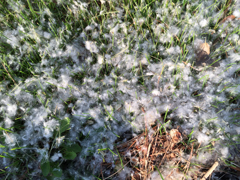 It’s summer snow time! Not freak storms where six-sided frozen ice crystals fall on the ground as if it were December. I mean the fluffy seed pods that look like cotton floating in the air. Watching the aerobatics of these fuzzy flyers always brings a smile to my face. Even now as a storm brews outside, the summer snow adds lightness to the weather’s ugly background.
It’s summer snow time! Not freak storms where six-sided frozen ice crystals fall on the ground as if it were December. I mean the fluffy seed pods that look like cotton floating in the air. Watching the aerobatics of these fuzzy flyers always brings a smile to my face. Even now as a storm brews outside, the summer snow adds lightness to the weather’s ugly background.
I’ve always wondered what creates this seasonal display and decided to do some investigation. At first I thought it to be milkweed. However, it turns out milkweed seeds let loose in the fall. After a little more digging, I found the most likely source is cottonwood (poplar) trees.
Where do they grow? Although I see their seeds flying, I can’t say I’ve ever seen a tree with pods like in the pictures I looked at. That may be because these are some of the tallest (67 – 130 ft.) growing trees around with branches too high to see the pods. Even if the pods are largely out of sight, the seeds do a great job of making the presence of the trees known.
There’s a danger to doing research into things you look at in wonder and enjoyment. It’s finding out realities that make you lose your engagement with what seems transcendent or even divine. In this case, I found my pleasure under attack from stories about how the loss of milkweed in the environment is one factor in the decline of monarch butterfly populations. Another assault came from reports that people cut down cottonwoods in a mistaken belief that it will reduce pollens that cause allergies.
My defense is to remember how much fun it is to drive through seed squalls without fear of losing visibility or traction. Another is thinking about making angels in patches of cotton on the lawn.
Sue, your story reminds me to open my eyes and appreciate the beautiful sights in nature.
Sue, the beauty and significance of summer snow comes across in your descriptive article. Very nice.
Thank you, Kelly!
Good story. I enjoyed your insights.
Thank you, Claire!
You make a great point about marveling at the mystery rather than discovering the reality.
Thank you, Karen!